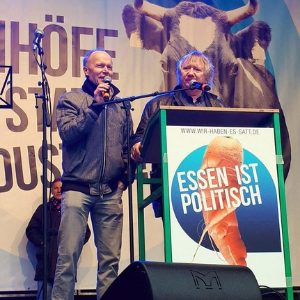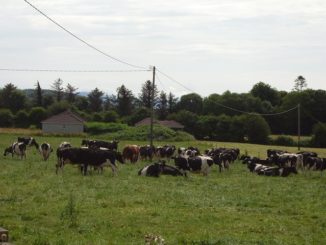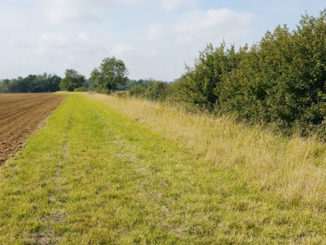

Hannes Lorenzen, President of ARC2020, on the state and prospects of EU agricultural policy. This interview originally appeared in German in the magazine “Unabhängige Bauernstimme”.
Bauernstimme: There have been massive protests by farmers in many European countries in recent months. Depending on the country, different agricultural policy issues have played a role, and even within countries there has been a diverse range of demands and a lot of dissatisfaction and anger. What was going on?
Hannes Lorenzen: I think that on closer inspection, the diversity of frustrations and demands during the protests could not so easily be grasped, even for those being curious – and that is precisely the problem. The farmers’ associations of the European umbrella organisation COPA-COGECA used very banal slogans to bring the sometimes very different, justified anger of the farmers into line.
Those slogans were used for a general mobilisation against the Green Deal, claiming to be against bureaucracy, excessive environmental measures and the EU in general – in Germany it became an attack on the Federal Government – the so-called Traffic Light coalition. This Europe-wide mobilisation had been strategised by COPA for some time and was pushed at the moment when the concrete launch of the Green Deal was about to be implemented in the member states.
BS: How were the protests mobilised?
HL: In Spain, pig producers took to the streets against animal welfare measures; in France and Belgium, dairy farmers against wrong market organisation; in Poland and other Eastern European countries, grain producers mobilised against cheap imports from Ukraine. In Germany, the removal of farm diesel subsidies was the straw that broke the camel’s back. But the mood of frustration and uprisings had already been boiling for a long time in various other areas: the demanded animal welfare measures in livestock farming without sufficient support; falling producer prices for milk and meat, unfair competition on global ag markets, insufficient import protection against social and ecological dumping.
Even those farmers who have long been on the road to a new farming culture that does justice to the climate crisis and many other challenges had good reasons to join in the demonstrations. But it was extremely difficult for the latter to be visibly distinct enough from the aggressive propaganda of the established farmers’ associations and, above all, from the extreme right, by explaining their differentiated demands of a civil society coalition such as those put forward by the Borchert Commission in Germany.
BS: What has remained in public opinion after the protests?
HL: Unfortunately, after the months of farmers’ demonstrations, a completely wrong impression is left in the general public: The farmers were many, loud, radical and therefore successful. They got rid of useless bureaucracy and nonsensical environmental regulations. So all is well. That’s not true at all. The core of the problem remains: the CAP keeps driving farmers in the wrong direction and against each other for decades. The destructive growth compulsion remains, as does the unfair subsidy policy. This is what the conventional farmers’ associations, COPA and the agro-industrial complex wanted. Before the elections to the European Parliament (EP), the misleading impression that the CAP is being improved and simplified must be put right.
And on this point it seems that the social alliances and critical scientific community have apparently not yet been able to agree on a clear common strategy and language. The agro-ecological-environmental platforms are not reaching the general public because they try to rescue a CAP that is losing more and more political substance. Civil society must now come together across Europe with a clear message: We are fed up with an outdated and unfair agricultural policy! And we have feasible proposals.
BS: What role did the European Parliament play in the fast-track procedure to scrap the Green Deal from the CAP?
HL: The abolition of the Green Deal is an initiative and programme of the extreme right and the conservatives. The Commission, the Council and the Parliament have pushed through these demands in a rush, against existing democratic procedural rules. Unfortunately, parts of the socialists and liberals have also joined in.
Ms. von der Leyen personally ordered the withdrawal of Green Deal measures from the CAP. She is running for EU Commission President again and is now presenting herself as best farmer’s friend. She remorsefully corrects her errors of demanding too much from farmers. But in fact she leaves all the really central problems of the CAP untouched – unfair competition on world markets, unfair distribution of premiums per hectare, unfair central infrastructure only for large farms, unchecked market power of the supply and processing industry and the discounters and supermarkets. She thus runs the risk that the necessary transformation of the agricultural sector with regard to the climate crisis and the extinction of species will come to a standstill. Over the past three months, she has simply allowed the Green Deal in agricultural policy to be ploughed under before anything concrete could be implemented in the Member States. She has adopted the simple answers of Germany’s extreme right: Scrap the Green Deal! It couldn’t be simpler.
BS: This does not change the fact that the environmental and climate measures in the CAP came with a high level of bureaucracy.
HL: That’s the price you pay if you don’t really want to reform the CAP. Then it’s all a lot of small stuff, a green facade, sugar-coating, and then you have to check everything in detail because it makes no sense. There was no will to actually reduce the use of pesticides; now there is no complementary reduction at all. Farm to Fork was a nice image, but in the end the interests of the food industry were massively opposed to it and prevented sensible measures. The project of sustainable food systems was not even put on the table as a legislative proposal; the Nature Restoration Law was plucked naked beyond recognition. Soil improvement, crop rotation, species and animal protection, all voluntary measures for the motivated. This is CAP as you wish, not a future-proof farm and food policy. Along with the bureaucracy, the ambition of an agri-ecological transition has gone to trash.
BS: What challenges lie ahead for the next CAP reform from 2027, which a newly elected EU Parliament will have to deal with?
HL: The current decisions by the Council and the EP are taking the CAP back to where it was twenty years ago. The new Parliament will have to start afresh. Let’s consider the unlikely optimistic scenario: there are majorities beyond the conservatives and the extreme right combined. Then a sustainable CAP would have to be completely restarted. The AbL has been calling for this for years, as have the European platform associations. We need comprehensive rural development measures as a priority – securing and strengthening critical rural infrastructure economically, decentrally, socially, structures for the storage, processing and marketing of food and raw materials for peasant farms. This is a prerequisite for fair competition. Up to now, rural development funding has either been part of the grow-or -perish approach in regional and farming policy, which endangers precisely this critical infrastructure, or part of the second pillar of the CAP, which is supposed to compensate what the first pillar is destroying. A comprehensive agricultural transition would also include effective external protection against social and eco-dumping imports and a progressive public procurement policy.
 This article is produced in cooperation with the
This article is produced in cooperation with the
Heinrich Böll Stiftung European Union.
More on CAP Strategic Plans
A Sustainable Food System Law Paving the Way for an Ambitious CAP Reform
Impact of CAP Beyond the EU – A Closer Look on Soya Imports and Milk Product Exports
French CAP Strategic Plan : EU Sued over Approval of the Plan
“A Fairer CAP”, Really? | Analysing Fairwashing in CAP Talks and Practices
CAP Environmental Derogations: What is the Impact on Food Security?
CAP post-2027: An Integrated Rural and Agricultural Policy – Part 2
CAP post-2027: An Integrated Rural and Agricultural Policy – Part 1
Can the CAP Strategic Plans Help in Reaching our Pesticide Reduction Goals?
Wallonia’s Observation Letter: A plan that fails to address climate and biodiversity crises
CAP Strategic Plans and Food Security: Fallow Lands, Feeds, and Transitioning the Livestock Industry
A Just and Green CAP and Trade Policy in and Beyond the EU – Part 2
A Just and Green CAP and Trade Policy in and Beyond the EU: Part 1
Bulgaria’s CAP Strategic Plan: Backsliding on Nature and Biodiversity
Changes “required” to Ireland’s CAP Strategic Plan – European Commission
French CAP Plan: What Opportunities for Change During the New 2022-27 Presidential Term?
CAP, Fairness and the Merits of a Unique Beneficiary Code – Matteo Metta on Ireland’s Draft Plan
ARC Launches New Report on CAP as Member States Submit Strategic Plans
Slashing Space for Nature? Ireland Backsliding on CAP basics
Quality Schemes – Who Benefits? Central America, Coffee and the EU
Civil Society Organisations Demand Open and Ambitious Approval of CAP Plans
CAP Strategic Plans: Germany Taking Steps in the Right Direction?
CAP Strategic Plans: Support to High-Nature-Value Farming in Bulgaria
Commission’s Recommendations to CAP Strategic Plans: Glitters or Gold?
German Environment Ministry Proposals For CAP Green Architecture
CAP Performance Monitoring and Evaluation Framework – EP Position
A Rural Proofed CAP post 2020? – Analysis of the European Parliament’s Position
CAP Beyond the EU: The Case of Honduran Banana Supply Chains
CAP | Parliament’s Political Groups Make Moves as Committee System Breaks Down
CAP & the Global South: National Strategic Plans – a Step Backwards?
CAP Strategic Plans on Climate, Environment – Ever Decreasing Circles
European Green Deal | Revving Up For CAP Reform, Or More Hot Air?
Climate and environmentally ambitious CAP Strategic Plans: Based on what exactly?
How Transparent and Inclusive is the Design Process of the National CAP Strategic Plans?




